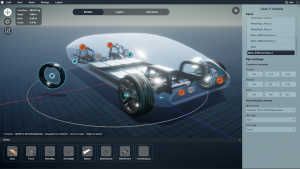DonutOS links virtual modelling with real vehicle behaviour to create what the company calls Digital Twin 2.0.
HELSINKI, FINLAND, November 20, 2025 /EINPresswire.com/ -- Finnish e-mobility tech company Donut Lab has released DonutOS, a software platform that changes how electric vehicles are conceived, engineered, and brought to life. DonutOS links virtual modelling with real vehicle behaviour to create what the company calls Digital Twin 2.0.
For years, automotive development has been split across separate tools and slow physical
Donut Lab CEO, Marko Lehtimäki, said: “DonutOS gives manufacturers the ability to design the entire vehicle – hardware, software, and behaviour – as a single digital organism. The goal is to help smaller mobility companies move faster, even when they don’t have the same resources as the big OEMs.
“Size shouldn’t count when it comes to innovation. With DonutOS we’re levelling the field and making advanced development approaches accessible.”
A unified way to build EVs
Traditional development relies on sequential stages: physical prototypes, lab tests, track tests, and late software integration. DonutOS replaces this with a single environment where mechanical, electrical, behavioural, sensor, and UI systems evolve together, meaning:
Development cycles that used to take years can be compressed into months or weeks
Startups can build vehicles with the sophistication of major OEMs without massive engineering teams
OEMs can slash prototyping costs and validate vehicle behaviour in conditions that would be impractical, or impossible, to replicate physically
Software-defined vehicle strategies finally become truly feasible, as updates and new capabilities can be designed, tested, and deployed across digital and physical fleets with total consistency
Digital Twin 2.0: from simulation to true system parity
Earlier digital twins modelled parts of a vehicle but not full system behaviour. Digital Twin 2.0 in DonutOS provides an interactive virtual vehicle that mirrors every system, sensor, control unit, and data flow. Engineers can now:
Test how an entire EV responds to real physics, environment conditions, and sensor stimuli, all before manufacturing
Observe full telemetry and data-bus activity exactly as it would occur in a production vehicle
Deploy the same software and logic to the physical vehicle once validated, ensuring continuity between digital intent and real-world performance
Supporting innovation at different scales
DonutOS gives small teams access to advanced development tools, while larger OEMs can reduce internal complexity by working from one shared model. Because DonutOS is built on the Donut Platform, recognized for its modular EV architecture and high-performance in-wheel motor technology, it offers an immediate path to production rather than being confined to the lab.
As part of the launch, Donut Lab has introduced the Global Innovators Program, giving early-stage EV companies early access to new technology, including DonutOS, along with tailored engineering support and preferential pricing at low volumes.
General availability for DonutOS will be announced later.


No comments:
Post a Comment